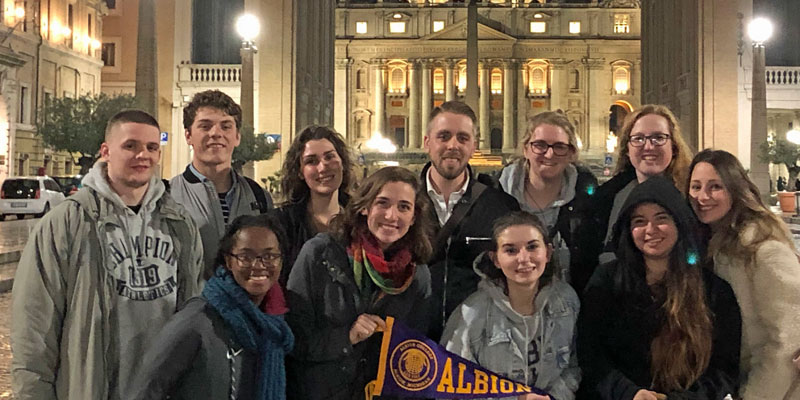Global Partnership Takes Sociology Class to Rome for Research Presentations
December 17, 2018

Sociology’s Euproean Integration course in Rome (left to right): Henry Swett, ’19, Antonio Mangiapane, ’21, Sydney Graham, ’19, Tess Youmans, ’21, Elle Jansen, ’19, professor Matthew Schoene, Melanie Pitt, ’21, Nicole McCann, ’20, Elizabeth Garcia, ’20, Nikita Mehaney, ’20, and Ashley Hanna, ’19.
On the list of unexpected things professors say in class, “Hey, we’re all going to Italy” has to rank at the top. Nonetheless, that was the surprise given to 10 Albion students this semester. Just before Thanksgiving, sociology professor Matt Schoene’s European Integration class traveled to John Cabot University (JCU) in Rome, to present their research projects via an international conference with their JCU counterparts.
The trip was funded by the Global Liberal Arts Alliance, an international organization that supports innovative course partnerships between its member institutions. Schoene, a contemporary European sociologist, and medieval historian Fabrizio Conti, knew their very different courses sometimes covered similar topics: economics crises, international relations, conflicting religious practices, migration and more.
“We thought it would be interesting to give our students these topics and let them see how they fit together,” Schoene says.
“When I first registered for this course, I had no idea what to expect, or, whether I would enjoy the course content or not. I wouldn’t say I was particularly excited at first,” says Henry Swett, ’19, an accounting major who converted his sociology minor to a double major at the start of this academic year.
Swett and Albion classmate Antonio Mangiapane, ’21, researched corruption as a determinant of Greece’s recent economic crisis and current Bulgarian society, while their JCU counterpart outlined markers of Slavic cultural development a millennium earlier. Together they aimed to shed light on the modern-day state of Eastern Europe.
Swett and his partners saw that despite the separation of centuries, there are possible links between the medieval development of Slavic societies and Greece and Bulgaria today. “For example, the Slavs were much slower to transition from a tribal system to a feudal system. There’s also a history of corruption in countries like Bulgaria and Greece, which prohibits them from matching the progress of Western European countries like Germany and France,” Swett explains. “Our JCU partner’s work really gave us insight on something we didn’t expect to learn.”
“Conducting a global course connection with a class that wasn’t even in the same department as mine presented some serious challenges,” notes Schoene. “Students had to navigate a six-hour time difference, work remotely with a partner they had never personally met, and present their work in an international setting. But each student was hard-working, creative and curious, and they gave presentations which clearly showed a strong effort to link the issues of contemporary European society to the Continent’s history. I’m very proud of the work they did.”
Swett reflects a similar assessment of Schoene and Conti’s work.
“All of us were thankful to experience and learn ‘the process’ of conducting research, communicating with peers overseas and sharing our research at a professional conference,” he says. “Of course, the weight of the project was nerve-racking, but we were given constant feedback and motivated to keep moving forward. In the end, what I initially felt intimidated by—traveling overseas to present research—turned out to be something myself and all my classmates were fully capable of.”
Read about the grant funding that helped make the trip possible